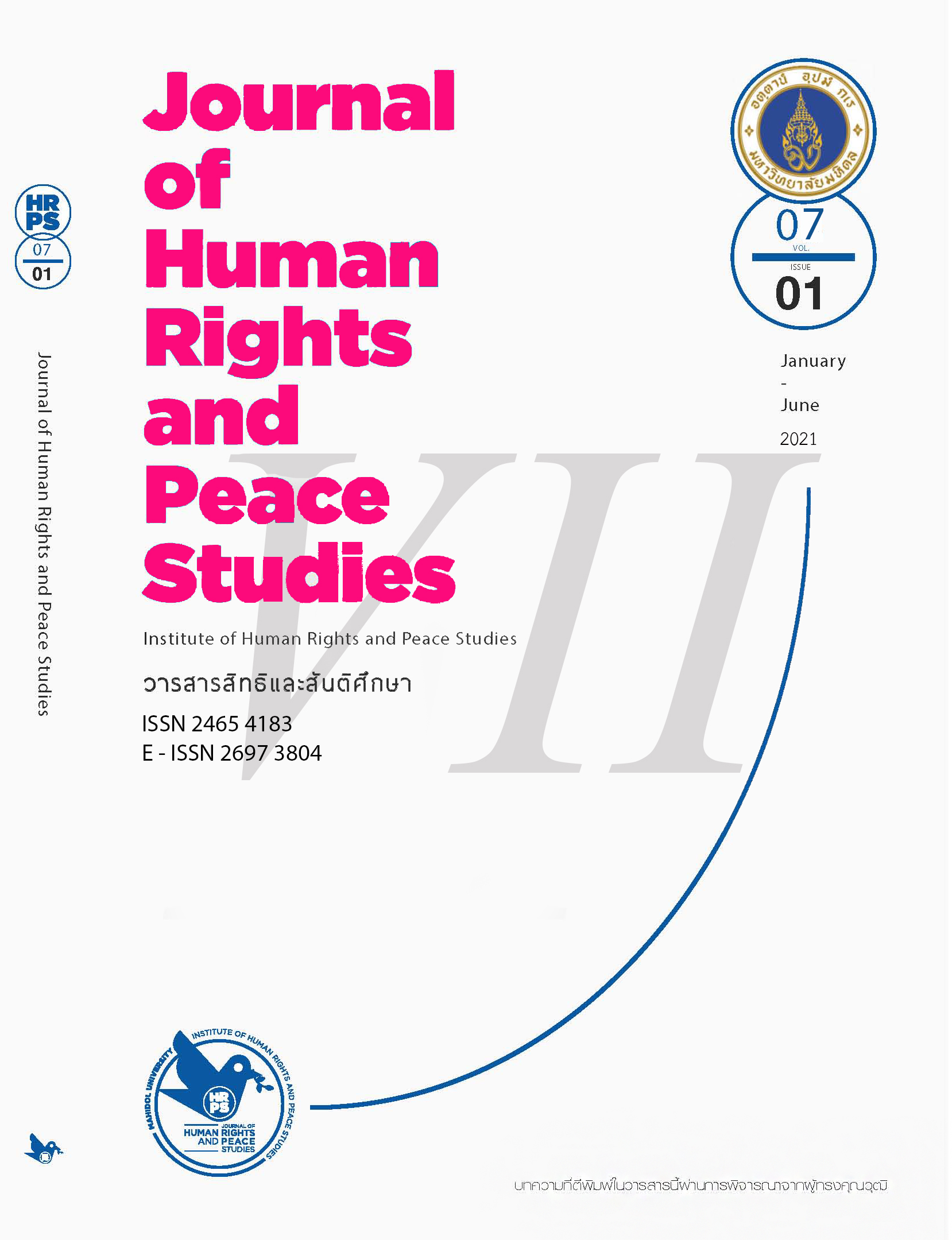การศึกษาการจัดกิจกรรมการเรียนรู้เชิงรุกสําหรับอาจารย์ผู้สอนกลุ่มสาระสังคมศึกษา ศาสนา และวัฒนธรรม โรงเรียนสาธิตมหาวิทยาลัยศรีนครินทรวิโรฒประสานมิตร (ฝ่ายประถม) / A Study of Active Learning Activities for Teachers, Social Studies, Religious and Cultural Groups, Srinakharinwirot University Demonstration School (Primary Department)
Main Article Content
Abstract
A study of Active Learning activities for teachers, social studies, religious and cultural groups, Srinakharinwirot University Demonstration School ( primary department) aims 1) to study the condition of organizing aggressive learning activities of teachers, social studies, religion and primary culture at the grade 1-3 primary school. 2) to study the condition of organizing aggressive learning activities of teachers, social studies, religion and culture at the grade 4-6 primary school. the method of this research is this research is qualitative research, the researcherscollect data by studying from documentary research together withan in-depth interview with informants once the interview is complete, the information is taken to be transcribed verbatim. and data analysis through content analysis. the research area is the Demonstration School of Srinakharinwirot University, Prasarnmit ( primary school). The result of this research is from Results of Active Learning are as following. 1) The results of the Active Learning at the primary school emphasis on thinking and practice to foster critical skills in social studies such as critical thinking and working with others. 2) The results of the Active Learning at the primary school level were found that focus on students to think critically by discussion toexpand knowledge as well as seek knowledge for themselves.
Article Details

This work is licensed under a Creative Commons Attribution-NonCommercial-NoDerivatives 4.0 International License.
The views, opinions, and pictures expressed in this journal are those of the authors and do not necessarily reflect the opinions and viewpoints of the editor and the editorial board. All rights are reserved by the authors and the Institute of Human Rights and Peace Studies of Mahidol University. No part of this journal may be reproduced, stored in a retrieval system, or transmitted in any form or by any means without the prior permission in writing from the journal’s editor, or as expressly permitted by law, or under terms agreed with the appropriate reprographics rights organization. Non-commercial use of information in this journal must be properly referenced.
References
Angkhasanyalak, Y. (2016).Phon khō̜ng kānčhat kitčhakam kānrīanrū ph āsā Thai dōi chai krabūankān hā khan thī mītō̜ khwāmsāmāt nai kān khit wikhro̜ læ thatsanakhati kānrīanrū chœ̄ng rukkha ʻong nakrīan matthayommasưksā pī thī sī [Effects of organizing Thai language learning activities by using 5-step process on analytical thinking ability and active learning attitudes of tenth grade students]. [ Master's thesis,Faculty of Education, Chulalongkorn University]. http://doi.org/10.14457/CU.the.2016.379. (in Thai).
Chaiyod, R. (2010). Active learning. Academic News Academic Service and Development division, Faculty of Pharmaceutical Sciences, Chiang Mai University. (in Thai).
Chansukon, C. (2008). Wichāsangkhommasưksā: Sāt hǣng kārabūn nā kān [Social studies: The science of integration]. Journal of Education, 9(1), 16-23. http://ejournals.swu.ac.th/index.php/jedu/article/view/438 (in Thai).
Intarit, W. (2019). Sangkhommasưksā læ kānsāng khwāmpen phonlamư̄ang dīph āitai rabō̜p kānmư̄ang kān pokkhrō̜ng Thai [Social studies and citizenship under Thailand’s politics and government]. Hatyai Academic Journal, 17(1), 85-101. https://so01.tcithaijo.org/index.php/HatyaiAcademicJournal/article/view/142573/137861. (in Thai).
Pinla, W., & Pinla, W. (2018). Kānčhatkān rīanrūsangkhommasưksā nai yuk satawat thīyīsipʻet [Social studies learning management in the century 21]. Chulalongkorn University Press. (in Thai).
Pruettikul, S. (2012). Khunnaphāp phū rīan: Kœ̄t čhāk krabūankān rīanrū [Quality of studentsderived from Active Learning process]. Journal of Educational Administration Burapha University, 6(2), 1-13. https://so02.tci-thaijo.org/index.php/EduAdm_buu/article/ view/11570. (in Thai).
Songkram, N. (2014). Kānsưksā nō̜k sathānthī læ kānsưksā nō̜k sathānthī samư̄an phư̄a kānrīanrū chœ̄ng ruk [Field trip & virtual field trip for active learning]. Chulalongkorn University Press. (in Thai).
Sripokangkul, S. (2020). Kānsưksā phư̄a sāng khwāmpen phasoknikō̜n thī chư̄ang: Nai ya khō̜ng kānsưksā wichā nāthī phonlamư̄ang nai rōngrīan Thai [Education for the production ofdocile subjecthood: Implication of civic education subject in Thai school]. Journal of Human Right and Peace Studies, 6(1), 28-59. https://so03.tci-thaijo.org/index.php/HRPS/article/view/240807/165580. (in Thai).
Srisuk, S. (2017, June 14). Len phư̄a rīanrū Play for Learning [Play to learn: Play for learning]. https://www.trueplookpanya.com/knowledge/content/59441/-parpres-par. (in Thai).
Westheimer, J., & Kahne, J. (2004). What kind of citizen? The politics of educating for democracy. American Educational Research Journal, 41(2), 237-269. https://doi.org/10.3102/00028312041002237
Wiboonsin, K. (2017). Phonkān čhat kitčhakam kānrīanrū khanittasāt tām nǣokhit hō̜ng rīan klap thāng rūam kap kānrīanrū chœ̄ng ruk thī mī tō̜ khwāmsāmāt nai kān kǣ panhākhanittasāt læ khwāmsāmāt nai kān khit yāng mī wičhāranayān khō̜ng nakrīan matthayommasưksā pī thī hā [Effects of organizing mathematics learning activities using the flipped classroom approach and active learning on mathematical problem solving and critical thinking abilities of eleventh grade students] [Master’s thesis, Faculty of Education, Chulalongkorn University]. (in Thai).
Wittayakorn, C. (2016). Rāing ān saphāwa kānsưksā Thai pī 2557/2558: Čha patirūp kānsưksāThai hai than lōk nai satawat thī yīsipʻet dai yāngrai [State of Thai education 2014/2015: To reform the Thai education: How to keep up with the world in the 21st century?”]. Office of the Education Council, Ministry of Education. (in Thai).


